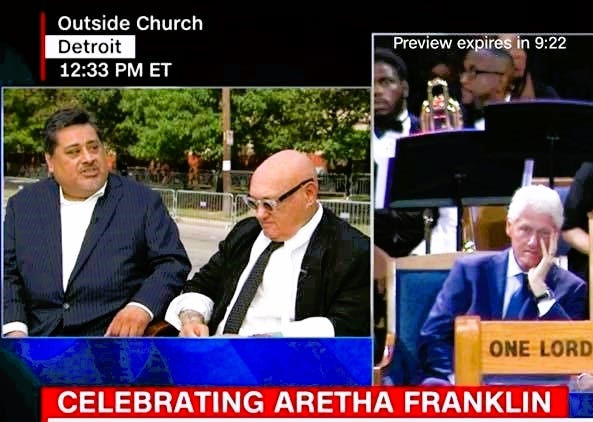Rodriguez, subject of Oscar-winning doc 'Searching for Sugar Man,' dies at 81
 Louis Aguilar
Louis AguilarDetroit ― Sixto Diaz Rodriguez, the Detroit musician who rose to international fame as the subject of the Oscar-winning documentary "Searching for Sugar Man," died Tuesday night. He was 81.
Rodriguez had been in declining health following a stroke last year and he passed away in his longtime Detroit home in the Woodbridge neighborhood.
"As he would have preferred to be at home" for his death, his daughter Regan said Wednesday. He died of natural causes, she said.
The 2012 "Searching for Sugar Man" documentary traced the nearly unbelievable tale of the folk musician's journey from obscurity to international success that he achieved decades after he recorded two albums in Detroit in the early 1970s. The film, written and directed by Malik Bendjelloul, won the Academy Award for Best Documentary Feature at the 85th Academy Awards ceremony in 2013.
"It's been a great odyssey," Rodriguez told The Detroit News in a 2008 interview. "All those years, you know, I always considered myself a musician. But, reality happened."
Rodriguez recorded two albums in the early 1970s in Detroit: "Cold Fact" (1970) and "Coming From Reality" (1971). Both flopped commercially in the United States.
Rodriguez thought it was the end of his musical story. He worked day labor and started a family, including three daughters. He got a philosophy degree from Wayne State University and became politically active. He unsuccessfully ran for mayor, City Council and state Senate.
Eventually, he became a Cass Corridor character and could often be seen walking in the neighborhood dressed in black, a guitar case slung over his shoulder.
The only clue that his music registered to anyone came in 1979 when he was asked to perform in Australia. He went again in 1981.
"I thought they were strange flukes," said Rodriguez, who also thought it was particularly sweet and strange that many people knew the words to his songs. He also had a following in New Zealand.
One Rodriguez song that gained popularity was "Sugar Man." The song has plenty of drug references and describes the perils of addiction.
He went back to surviving in Detroit. But the arrival of the internet changed his life. His daughter Eva found websites dedicated to him in South Africa. One said he had shot himself on stage. Another declared he overdosed on heroin.The founders of one of those sites, a rock journalist named Craig Bartholomew, ended up calling Rodriguez after searching for him for years. Shortly after, another devout fan, Stephen Segerman, called him.
"I told him, 'In South Africa, you're bigger than Elvis,'" Segerman told The News in 2008.
The escapist, gritty themes of Rodriguez's songs struck a chord with many repressed young South Africans trying to grapple with their country's brutal apartheid government, which treated Blacks and other non-Whites like second-class citizens.
"Like a lot of people here, I discovered Rodriguez while I was in the Army, which every 18-year-old used to have to do," Segerman said. "He was on everyone's cassette tapes. It's great pop music. But you start to realize this is raw, brutally honest ― and that's the chord it struck. I was in the Army, but I didn't want to be a soldier. I didn't support apartheid. Raw, brutal, honest had lots of appeal."
Around 2008, his albums were re-released, garnering him a wave of critical acclaim, and he began touring. But the success of "Searching for Sugar Man" led to all sorts of late-career success. He performed in large venues in multiple countries and elite music festivals such as Coachella.
He performed in about 30 countries, according to Regan, who often accompanied him, serving at times as his manager and publicist. Among his fans are legendary guitarist Carlos Santana, Jack White, the band Los Lobos and the actor Russell Crowe, Regan said. Lars Ulrich, the drummer for the band Metallica, lists Rodriguez's "Sugar Man" as one of his favorite songs.
In 2022, U.S. musician Dave Matthews played at Pine Knob, met Rodriguez and praised him from the stage during the concert, saying Rodriguez was “one of my heroes growing up” in Johannesburg, South Africa.
On Wednesday, tributes from across the globe appeared on social media.
Primal Scream bassist Simone Marie Butler said she "was lucky to see him live at the Royal Albert Hall a few years ago," referring to the legendary venue in London. "I’d say most of the audience including myself were in tears by the end. What a beautifully unique soul.”
United Kingdom-based music and cultural writer Thomas Hobbs described Rodriguez's records as "two of the greatest albums of the 1970s." Hobbs added: "His story of experiencing delayed adulation/fame carries a romance that will never not be inspiring. RIP to a legend.”
Rodriguez was the sixth child of Mexican immigrants. Raised in southwest Detroit, he is of Spanish and indigenous heritage, Regan said.
His longtime home in Woodbridge was bought years ago when it "was in shambles," Regan said. Even as he gained fame and financial stability, he never seriously considered leaving Detroit, she said.
"The world is such a big place and there's enough for everyone," Rodriguez told The News in 2008. "More than enough. To say you want it all ― there's just so much to share and the beautiful part of it is I get to share this with so many people."
Funeral arrangements and a potential memorial are in the planning stage, Regan said Wednesday.
laguilar@detroitnews.com